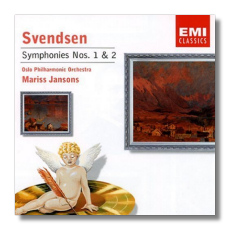
The Internet's Premier Classical Music Source
Related Links
- Latest Reviews
- More Reviews
-
By Composer
-
Collections
DVD & Blu-ray
Books
Concert Reviews
Articles/Interviews
Software
Audio
Search Amazon
Recommended Links
Site News
 CD Review
CD Review
EMI Classics

- Jacques Offenbach (arr. Rosenthal) Gaîté Parisienne
- Emil Waldteufel:
- España
- Les Patineurs
- Estudiantina
- Acclamations
Monte Carlo Philharmonic Orchestra/Manuel Rosenthal & Willi Boskovsky
EMI Classics 5 85066-2 ADD 70:29


Johan Svendsen
- Symphony #1 in D Major, Op. 4
- Symphony #2 in B Flat Major, Op. 15
Oslo Philharmonic Orchestra/Mariss Jansons
EMI Classics 5 85069-2 DDD 68:00
Here are two more releases in EMI Classics' budget-priced "Encore" line. Apart from the sketchy booklet notes, however, there's nothing second-rate about these discs.
The performance is brash, and so is the engineering – EMI seems to have used a railroad tunnel as a recording venue – and yet Manuel Rosenthal's recording of Gaîté Parisienne demands to be heard. The reason for this is that it was Rosenthal himself who compiled and arranged this ballet score, which first saw light of day in Monte Carlo in 1938. In other words, contrary to popular belief, Offenbach did not write Gaîté Parisienne. Instead, Rosenthal selected some of the most potentially danceable moments from several Offenbach operettas (plus The Tales of Hoffmann) and stitched them together into a seamlessly merry garment for impresario Sol Hurok, dancer and choreographer Léonide Massine, and the Ballet Russe of Monte Carlo. Rosenthal's sources are revealed in the booklet's track listing, a feature many other recordings omit. Compared to almost every other recording, Rosenthal's tempos are slow. Initially, his interpretation feels too heavy and accented, but one should remember that Rosenthal's original intention was to write music suitable for dancing. A hyperbrilliant performance such as Georg Solti's or Arthur Fiedler's, for example, is exciting to hear, but it doesn't have as much theatrical validity as Rosenthal's. I'm not going to give up Fiedler, Solti, Karajan, and many others, but Rosenthal is a keeper because he gives me a new and valid perspective on this score. By the way, this recording previously was available only as a Japanese import, so this inexpensive reissue should excite many collectors.
Apparently Boskovsky's Waldteufel program was recorded in the same month, in the same venue, and with the same production team, yet the results are very different. Here, the engineering is big without becoming cavernous, and the Monte Carlo Philharmonic Orchestra sounds more assured than they did under Rosenthal. This is deliciously extraverted music, deliciously conducted by Boskovsky. Everyone knows Les Patineurs (aka "The Skaters' Waltz"). Paying serious attention – which many do not bother to do – reveals what a fine piece of music it really is. Estudiantina and España are big waltzes with a Spanish accent, oddly enough. (The latter is an adaptation of Chabrier's famous symphonic work.) Acclamations is a symphonic waltz in the tradition of Johann Strauss II, albeit a little updated. These four waltzes tip the balance in favor of this CD, even for those who may question Rosenthal's idiosyncratic Gaîté Parisienne.
Listening to Johan Svendsen's two symphonies, one might well be moved to think of him as a Norwegian Dvořák. Symphonic skill and national pride are tightly interwoven in both composers, and there's a vigorously pastoral quality in Svendsen's music to which the Bohemian composer would no doubt have been sympathetic. Svendsen (1840-1911) was both a contemporary and a friend of Edvard Grieg, In fact, the story goes that Grieg suppressed his sole symphony after hearing Svendsen's first effort in this genre.
As a young man, Svendsen studied at the Leipzig Conservatory, and on the basis of these symphonies, we can assume that he was an attentive and talented pupil. Any Norwegian can look to these works with pride. The slight disappointment attached to them is that they are too similar to each other; there's little development from one symphony to the next. For example, both finales use a slow introduction to usher in the faster movement proper. Having said that, it is the Second Symphony which I would recommend first. Its third movement is a charming Norwegian dance, and its finale is filled with the joy of living.
The Russian-born Jansons (son of the conductor Arvid Jansons) was music director of the Oslo Philharmonic between 1979 and 2000. These recordings were made in 1987, and originally were released on EMI Classics' full-priced label. They are completely satisfactory, and are a good alternative to the more expensive version by Neeme Järvi on BIS. The Norwegian strings are not as rich as one might like, and Jansons could be more emotional, but these faults are minor ones.
Copyright © 2005, Raymond Tuttle




















